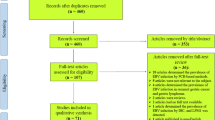Abstract
Background
Epstein–Barr virus (EBV)-positive gastric cancers represent a distinct subtype of gastric cancers and account for nearly 10% of the gastric cancer burden, yet risk detection strategies for this cancer subtype are lacking.
Methods
We conducted a nested case–control study where we assayed 4 EBV antigens [viral capsid antigen (VCA), early antigen (EA), Epstein–Barr nuclear antigen (EBNA), and BZLF1-encoded replication activator protein (ZEBRA)] in either sera or plasma from 1447 gastric cancer cases and 1797 controls obtained from seven prospective cohorts representing individuals from the high gastric cancer-risk countries of China, Japan, and Korea.
Results
The prevalence of EBV sero-positivity was universal with the exception of one sero-negative individual, and the highest titers of the EBV antigens VCA (OR 0.95, 95% CI 0.78–1.17), EBNA (OR 0.88, 95% CI 0.72–1.08), EA (OR 0.97, 95% CI 0.79–1.19), and ZEBRA (OR 0.87, 95% CI 0.71–1.07) were not associated with risk of incident gastric cancer. When we stratified these data by H. pylori status, there was no change in the association.
Conclusions
Multiplex serology of the aforementioned EBV antigens in serum may not be a suitable biomarker for predicting gastric cancer risk in East Asian populations.
Similar content being viewed by others

References
Niedobitek G, Meru N, Delecluse HJ. Epstein–Barr virus infection and human malignancies. Int J Exp Pathol. 2001;82:149–170.
Ferlay J, Soerjomataram I, Dikshit R, et al. Cancer incidence and mortality worldwide: sources, methods and major patterns in GLOBOCAN 2012. Int J Cancer. 2015;136:E359–E386.
Murphy G, Pfeiffer R, Camargo MC, Rabkin CS. Meta-analysis shows that prevalence of Epstein–Barr virus-positive gastric cancer differs based on sex and anatomic location. Gastroenterology. 2009;137:824–833.
Coghill AE, Hildesheim A. Epstein–Barr virus antibodies and the risk of associated malignancies: review of the literature. Am J Epidemiol. 2014;180:687–695.
Young LS, Yap LF, Murray PG. Epstein–Barr virus: more than 50 years old and still providing surprises. Nat Rev Cancer. 2016;16:789–802.
Fuentes-Panana EM, Morales-Sanchez A. Epstein–Barr virus-associated gastric cancer and potential mechanisms of oncogenesis. Curr Cancer Drug Targets. 2016;16:1–21.
Saju P, Murata-Kamiya N, Hayashi T, et al. Host SHP1 phosphatase antagonizes Helicobacter pylori CagA and can be downregulated by Epstein–Barr virus. Nat Microbiol. 2016;1:16026.
De Vathaire F, Sancho-Garnier H, de-The H, et al. Prognostic value of EBV markers in the clinical management of nasopharyngeal carcinoma (NPC): a multicenter follow-up study. Int J Cancer. 1988;42:176–181.
Henle G, Henle W. Epstein–Barr virus-specific IgA serum antibodies as an outstanding feature of nasopharyngeal carcinoma. Int J Cancer. 1976;17:1–7.
Kim Y, Shin A, Gwack J, et al. Epstein–Barr virus antibody level and gastric cancer risk in Korea: a nested case-control study. Br J Cancer. 2009;101:526–529.
Koshiol J, Qiao YL, Mark SD, et al. Epstein–Barr virus serology and gastric cancer incidence and survival Br J Cancer. 2007;97:1567–1569.
Levine PH, Stemmermann G, Lennette ET, Hildesheim A, Shibata D, Nomura A. Elevated antibody titers to Epstein–Barr virus prior to the diagnosis of Epstein–Barr-virus-associated gastric adenocarcinoma. Int J Cancer. 1995;60:642–644.
Shinkura R, Yamamoto N, Koriyama C, Shinmura Y, Eizuru Y, Tokunaga M. Epstein–Barr virus-specific antibodies in Epstein–Barr virus-positive and -negative gastric carcinoma cases in Japan. J Med Virol.. 2000;60:411–416.
Michel A, Waterboer T, Kist M, Pawlita M. Helicobacter pylori multiplex serology. Helicobacter. 2009;14:525–535.
Teras LR, Rollison DE, Pawlita M, et al. Epstein–Barr virus and risk of non-Hodgkin lymphoma in the cancer prevention study-II and a meta-analysis of serologic studies. Int J Cancer. 2015;136:108–116.
Cai H, Ye F, Michel A, et al. Helicobacter pylori blood biomarker for gastric cancer risk in East Asia. Int J Epidemiol. 2016;45:774–781.
Gao L, Michel A, Weck MN, Arndt V, Pawlita M, Brenner H. Helicobacter pylori infection and gastric cancer risk: evaluation of 15 H. pylori proteins determined by novel multiplex serology. Cancer Res. 2009;69:6164–6170.
Shakeri R, Malekzadeh R, Nasrollahzadeh D, et al. Multiplex H. pylori serology and risk of gastric cardia and noncardia adenocarcinomas. Cancer Res. 2015;75:4876–4883.
Gao L, Weck MN, Michel A, Pawlita M, Brenner H. Association between chronic atrophic gastritis and serum antibodies to 15 Helicobacter pylori proteins measured by multiplex serology. Cancer Res. 2009;69:2973–2980.
Camargo MC, Murphy G, Koriyama C, et al. Determinants of Epstein–Barr virus-positive gastric cancer: an international pooled analysis. Br J Cancer. 2011;105:38–43.
Shannon-Lowe C, Rowe M. Epstein–Barr virus infection of polarized epithelial cells via the basolateral surface by memory B cell-mediated transfer infection. PLoS Pathog. 2011;7:e1001338.
Ji MF, Wang DK, Yu YL, et al. Sustained elevation of Epstein-Barr virus antibody levels preceding clinical onset of nasopharyngeal carcinoma. Br J Cancer.. 2007;96:623–630.
Li S, Deng Y, Li X, Chen QP, Liao XC, Qin X. Diagnostic value of Epstein-Barr virus capsid antigen-IgA in nasopharyngeal carcinoma: a meta-analysis. Chin Med J (Engl).. 2010;123:1201–1205.
Amieva M, Peek RM Jr. Pathobiology of Helicobacter pylori-Induced Gastric Cancer. Gastroenterology. 2016;150:64–78.
Treece AL, Duncan DL, Tang W, et al. Gastric adenocarcinoma microRNA profiles in fixed tissue and in plasma reveal cancer-associated and Epstein–Barr virus-related expression patterns. Lab Investig J Tech Methods Pathol. 2016;96:661–671.
Acknowledgments
This work was supported by the National Institute of Health and the National Cancer Institute R01CA174853 (M. Epplein) and the Molecular and Genetic Epidemiology of Cancer Fellowship R25CA160056 (X.-O. Shu, P. I. and M. G. Varga, Trainee) and the Cancer Control Education Program 2T32CA057726-26 (K. Ribisl, P. I. and M. G. Varga, Trainee). The Shanghai Men’s and Women’s studies were supported by Grants from the National Cancer Institute (R37 CA070867 and UM1 CA182910 to W. Zheng; R01 CA082729 and UM1 CA 173640 to X.-O. Shu).
Author information
Authors and Affiliations
Corresponding author
Ethics declarations
Conflict of interest
The authors declare no conflict of interest.
Electronic supplementary material
Below is the link to the electronic supplementary material.
Rights and permissions
About this article
Cite this article
Varga, M.G., Cai, H., Waterboer, T. et al. Epstein–Barr Virus Antibody Titers Are Not Associated with Gastric Cancer Risk in East Asia. Dig Dis Sci 63, 2765–2772 (2018). https://doi.org/10.1007/s10620-018-5154-9
Received:
Accepted:
Published:
Issue Date:
DOI: https://doi.org/10.1007/s10620-018-5154-9



